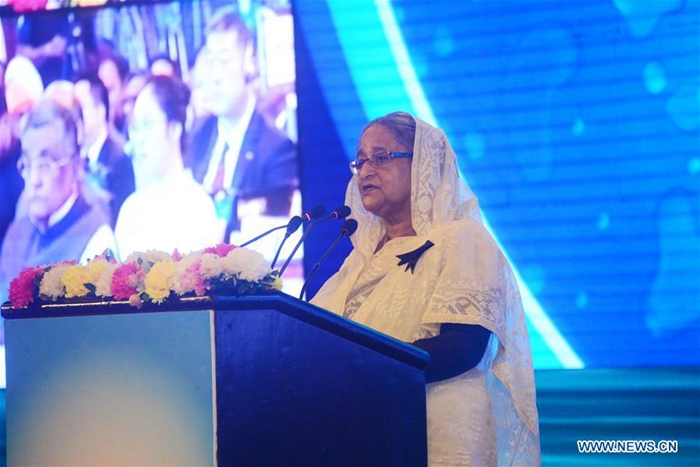Construction of China-funded sewage treatment plant starts in Bangladeshi capital

Bangladeshi Prime Minister Sheikh Hasina addresses at a ceremony after inaugurating the work for construction of China-funded "Dasherkandi Sewage Treatment Plant Project" in Dhaka, Bangladesh on Aug. 19, 2018. The construction of the China-funded mega sewage treatment plant started in Bangladesh's capital of Dhaka on Sunday. (Xinhua Photo)
The construction of a China-funded mega sewage treatment plant started in Bangladesh's capital of Dhaka on Sunday.
The sewage treatment project agreement, named the "Dasherkandi Sewage Treatment Plant Project," was signed between Dhaka WASA (Water Supply & Sewerage Authority) and Hydro China Corporation.
The project includes sewage treatment plants, pumping stations and a sewage pipe network with a sewage treatment capacity of 500,000 cubic meters of sewage a day.
The project is being funded by the Export-Import Bank of China.
On Nov. 23, 2014, Dhaka WASA entered into an engineering, procurement and construction (EPC) contract with Hydro China International Engineering Co. Ltd, a subsidiary of Hydro China Corporation, for the construction of the plant.
After the project is completed, the Chinese side will be responsible for operation and maintenance for one year.
"With the implementation of this project, it will be possible to provide modern sewerage service to about 5 million people of Gulshan, Banani, Baridhara, Bashundhara, parliament and adjoining areas including Hatirjheel of the city," Bangladeshi Prime Minister Sheikh Hasina said while declaring the groundbreaking of the project at a ceremony in Dhaka.
"We've taken initiatives to ensure environment friendly water management by reducing the dependence on ground water and soon the citizens will get benefit of it," she said.
The project is funded by the Chinese Government Concessional Loan and will help improve environment of Dhaka, Chinese Ambassador Zhang Zuo said at the launching of the project.
"The cooperation between our two countries in various sectors has brought tangible benefits to the people which sets a good example of South-South cooperation," he said.
Bangladesh's highest economic policy-making body, Executive Committee of the National Economic Council (ECNEC) chaired by Prime Minister Sheikh Hasina, has already approved the project.


